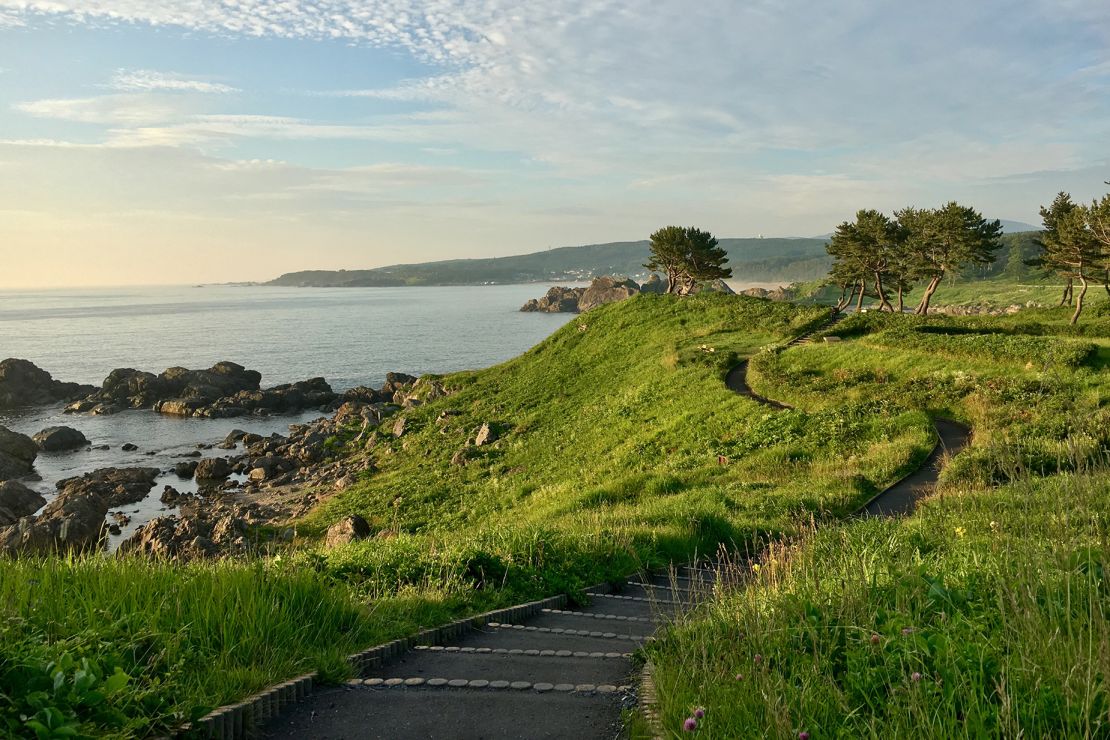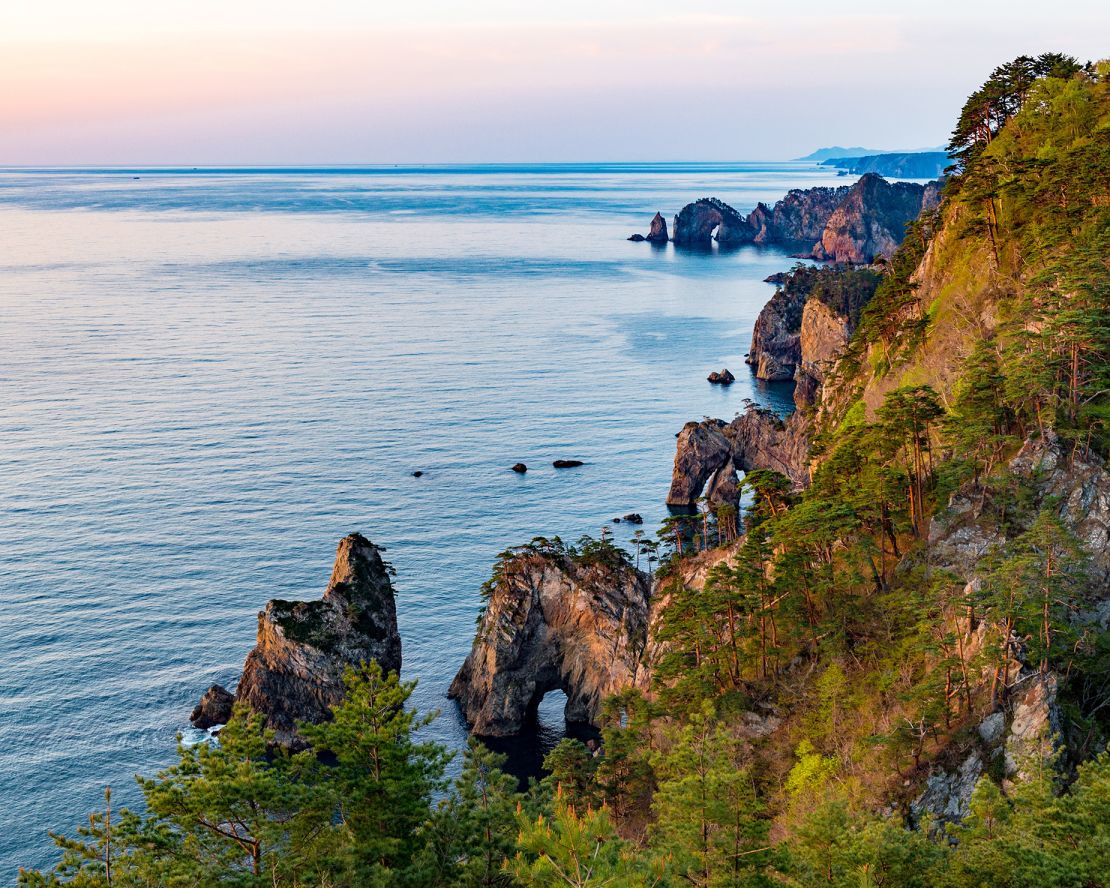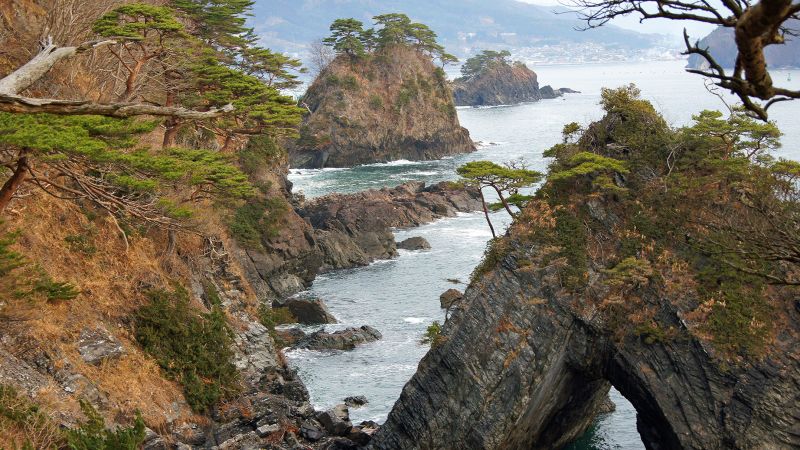Editor’s Note: This CNN Travel series is, or was, sponsored by the destination it highlights. CNN retains full editorial control over subject matter, reporting and frequency of the articles and videos within the sponsorship, in compliance with our policy.
Filled with stunning scenery, Japan is a hiker’s paradise, offering everything from quick city escapes in the countryside to multi-week treks that snake past dramatic seaside cliffs and alpine forests.
The country’s latest addition to the “epic hike” club is no exception.
The Michinoku Coastal Trail, stretching more than 1,000 kilometers (621 miles) along the country’s northeast Pacific coast on the main island of Honshu, passes through four prefectures and 29 municipalities, offering the perfect mix of scenery, culture and cuisine.
Officially launched in 2019, it’s one of several projects aimed at drawing more tourists to the country’s Tohoku region, which was devastated by the 2011 earthquake and tsunami. The name of the route is a throwback to ancient times, when Japan’s north-eastern Tohoku region was referred to as “Michinoku” – meaning “end of the road”.
Few know the trail as well as Robin Lewis, Japanese-British founder of the Michinoku Trail Walker Project, a website devoted to helping others make the most of the journey.
“Whether you’re a seasoned long-distance hiker or looking for a day trip with the family, the trail has something for everyone,” Lewis tells CNN Travel.
“The combination of dramatic natural landscapes, delicious northern dishes and the Tohoku region’s unique culture, as well as the ability to learn from and contribute to the rebuilding of a disaster-stricken region, make it a destination like no other.”
Though the Michinoku Coastal Trail is a few years old, the pandemic kept most international travelers out till late 2022.
What makes this trail different from the country’s many other epic hiking routes, says Lewis, is that it’s still relatively unknown – even in Japan.
“Only a reported 2% of international travelers visit the Tohoku region,” he says.
“I’ve walked several other trails in Japan, including the famous Kumano Kodo and Shinetsu Trail, and I think the Michinoku Coastal Trail offers more of an off-the-beaten-path adventure.“
Lewis has a personal connection to the Tohoku region. His mother’s family has roots in Miyagi, one of the four prefectures the trail runs through, and he witnessed the devastation caused by the 2011 earthquake firsthand, calling it a “major turning point” in his life.
Volunteering in the impacted areas, Lewis spent the next six years working full-time on issues related to natural disasters both in Japan and around the world, leading him to pursue a career in the social impact sector.
“I heard about the Michinoku Coastal Trail first in 2015, and knew immediately that I wanted to walk the entire trail; it combined my passion to support the recovery of the Tohoku region with my love of the outdoors and adventure,” he says.
“So in the summer of 2017, slightly burnt out and looking for a change, I decided to walk 600-plus kilometers along sections of the trail that were open at the time. Itching to get back after the trail’s completion in 2019, I then through-hiked the full 1,000-plus kilometer trail in 2022.”
On both occasions, Lewis took photos and shared his experiences online as he walked, even doing a TEDx talk about his journey and the many random acts of kindness he experienced along the way.
“I was genuinely surprised at the response I received and the level of interest from people around the world,” he recalls.
“As time went by, I received more and more inquiries about how others could make the journey themselves. And that’s why I set up the website – to help travelers, especially those from abroad, to learn about the trail, plan their journeys and explore the Tohoku region for all of its wonders.”

Guided treks and shorter hikes
There are two Michinoku Coastal Trail heads – the one in the north starts in Hachinohe City, in Aomori prefecture. The other is Soma City, in Fukushima prefecture in the south.
Walking the entire trail takes your average hiker between 40-50 days – a period too lengthy for many to manage.
Thankfully, the trail has many access points so there are opportunities to enjoy shorter hikes, while guided tours are also an option.
Walk Japan, which has been organizing hikes for over three decades, offers nine-day fully-guided treks in the Spring and Fall – the best times of year to visit – that allow travelers to have a multi-day trail experience.
Walk Japan CEO Paul Christie says all of their tours have been in demand since Japan emerged from the pandemic, but interest in their Michinoku Coastal Trail tour has been exceptional.
“As we add new departures they rapidly fill up,” he tells CNN Travel.
“Japan is criss-crossed by myriad trails but the Michinoku Coastal Trail is special for its spectacular coastal scenery and plentiful seafood cuisine but especially so for its people. It is extraordinary to see the resilience and determination of the locals, who welcome visitors with exceptional warmth and generosity.”
The Walk Japan journey begins in the north, in Hachinohe, following the trail alongside the coast, at times “bounded by soaring precipices,” at other times offering hikers an up-close look at “an intricate carving of inlets and bays,” says Walk Japan’s tour description.
“On our way we visit some of the most picturesque natural sights in Japan including classic pine tree coastlines and Jodogahama, a beautifully formed cliff of white sandstone framed by emerald seas.”
Meals include a wide variety of local seafood including abalone, oysters, clams, salmon and squid from the waters of Tohoku’s famed Sanriku Coast. In terms of hotels, Walk Japan travelers mainly stay in oceanside accommodations that incorporate baths overlooking the sea “for a delightful and leisurely way to relax before our culinary feasts each evening.”
As for difficulty, Christie says the trail is suitable for the more confident trekker “as it can be quite rugged with some steep ascents and descents. However, the wonderful and varied scenery more than makes up for the effort expended.”
In addition to its guided tour, Walk Japan also offers a self-guided 10-day Michinoku option.

Like Walk Japan’s Christie, Lewis has also noticed an uptick in interest in the new Michinoku Coastal Trail since Japan reopened in 2022, with visitors to his website more than doubling since last year.
“During the pandemic, I was surprised at how many people shared that they were eagerly waiting for the borders to open so they could walk the trail – now many of those people have finally come over and made it happen,” he says.
“Also, with the Japanese yen as weak as it is now, it’s a great time to be visiting from abroad.”
For those who only have time for a quick taste of the trail, Lewis recommends sticking to the northern section, specifically between the Hachinohe trailhead and Miyako city.
“The landscapes are wild and varied, from idyllic beaches to islands and ancient tunnels,” he says.
“Without a doubt, the trail section along the cliffs of Kitayamazaki and Unosu in Iwate is among the highlights of the trail. There are some strenuous ups and downs, but peering out over the 200-meter cliffs and going through the hand-dug tunnels nearby (where most visitors don’t venture) is a must.”
At the northern end, he says Tanesashi Kaigan in Aomori is a walker’s paradise, with relatively flat stretches of trail covering large grassy meadows and breathtaking views of the Pacific Ocean.
“Stroll along the nearby Osuka beach, famous for its ‘squeaky sand,’ said to be so pure and untouched that it makes a squeaking sound under your feet as you walk along,” he adds.
For those who want to tackle the entire 1,000 kilometers, Lewis recommends taking it as slow as possible.
“There is so much to see, so much to eat and drink, so much to learn and so many interactions to be had,” he says. “It can be tempting to rush through, but I would suggest leaving ample time and space in your schedule to allow for the unplanned.
“For me, and from the many stories I’ve heard from fellow hikers, it is the spontaneous interactions (even overcoming language barriers!) and the small side trips and deviations that make the journey so special.”
Indeed, when asked to recall a particularly memorable moment from his journey, Lewis points to a chance encounter that happened along the way.
“Having spent the better part of four hours walking through a mountain pass in torrential rain, I stood in the entrance of a small, dimly lit shop in the middle of a quiet village, completely drenched and questioning my life decisions,” he recalls.
“I shook off as much water as I could before entering, and timidly began looking for a bento box as my shoes squelched with every step. Ten minutes later, I was sitting with my legs tucked under a kotatsu, sipping on a hot cup of tea and tucking into a warm bowl of ramen noodles while my clothes dried by the stove. I’d been ushered into the attached family home by shopkeeper Chiba-san who (strongly) insisted I warm up and wait out the storm.”
Lewis says the hours slipped away as he chatted with the family, “including the indomitable ojiisan (grandfather), an 83-year old former professional boxer and avid table tennis player.”
Hours later, he emerged into the spring afternoon, “smiling, reinvigorated, and ready for the long journey ahead.”
“While the Michinoku Coastal Trail offers stunning scenery, the freshest seafood and so much more, it is these unplanned encounters that make it truly unforgettable,” Lewis says.
Access and planning
The four prefectures the trail passes through are Aomori, Iwate, Miyagi and Fukushima. Much of the trail is easily accessed by Japan’s famed Shinkansen bullet train network, including the two trail heads in Hachinohe and Soma City.
Lewis’ Michinoku Trail website offers a variety of route suggestions, as well as a list of accommodations, tips on budgeting and other valuable information for hikers.
Another worthwhile site for those considering making the journey to Tohoku is the Michinoku Trail Club, which has detailed advice in Japanese and English as well as regular news updates on detours and weather warnings.
Read the full article here


